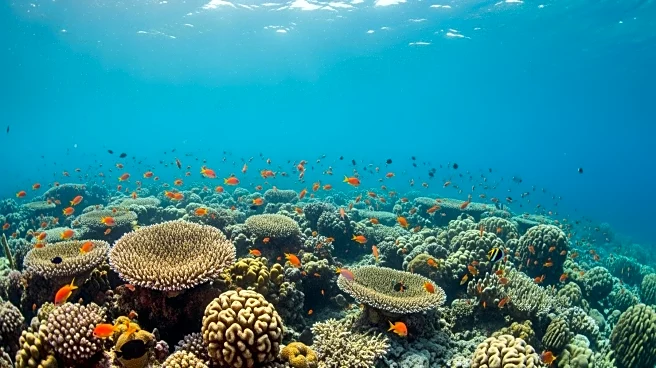What's Happening?
A recent Global Tipping Points Report has highlighted the critical state of the world's coral reefs, indicating that rising temperatures have pushed these ecosystems past a point of no return. The report, authored by environmental scientist Tim Lenton
and others, suggests that the dieback of warm-water coral reefs may be irreversible. This development is part of a broader pattern of environmental tipping points, including melting polar ice sheets and collapsing ocean currents. The loss of coral reefs poses a significant threat to marine ecosystems and the hundreds of millions of people who rely on them for food, coastal protection, and income.
Why It's Important?
The decline of coral reefs has far-reaching implications for biodiversity and human livelihoods. Coral reefs support a vast array of marine life and are crucial for the fishing and tourism industries. Their degradation could lead to economic losses and food insecurity for communities dependent on these ecosystems. Additionally, coral reefs act as natural barriers against storm surges and coastal erosion, providing protection to coastal areas. The report underscores the urgent need for global action to mitigate climate change and protect these vital ecosystems from further damage.
What's Next?
The report calls for immediate and concerted efforts to address climate change and its impacts on coral reefs. This includes reducing greenhouse gas emissions and implementing conservation strategies to protect remaining reef systems. International cooperation and policy changes will be essential to prevent further environmental tipping points and to support communities affected by the loss of coral reefs. Stakeholders, including governments, environmental organizations, and local communities, will need to collaborate to develop sustainable solutions.
Beyond the Headlines
The decline of coral reefs also raises ethical and cultural questions about humanity's responsibility to preserve natural ecosystems. The loss of these vibrant underwater landscapes could lead to a diminished appreciation for marine biodiversity and a loss of cultural heritage for communities that have historically depended on reefs. This situation highlights the need for a shift in how societies value and interact with natural environments, emphasizing sustainability and conservation.















